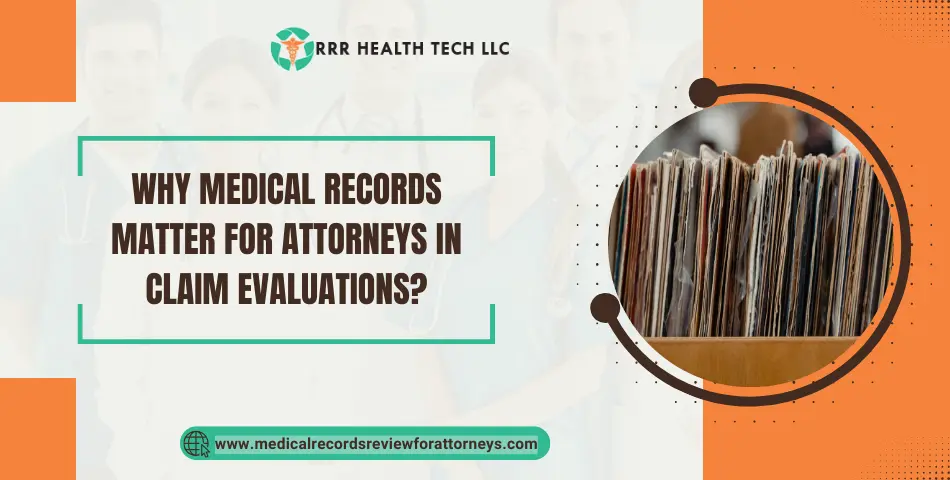
In the process of claim evaluations litigation, more specifically in personal injury, medical malpractice, and mass torts, the absence of proper medical records is a cardinal sin, the gravity of which cannot be appreciated enough. For attorneys engaged in such undertakings, medical records are not simply administrative requirements or documents: they are an integral part that defines the legal activity.
This blog seeks to analyze medical records that attorneys should take into consideration while assessing claimants and their medical narratives, to show how these records affect the strategy of the case, the processes of settlement, and the trial.
How Medical Documents Affect Legal Proceedings
Medical records capture all the diagnoses in a systematic and chronological order. This means that the management of these records entails more than just the chronological order of medical records. For Attorneys, such records are invaluable for the following reasons:
1. Providing Evidence in Support of a Claim:
Medical records are key cornerstones when instituting tort actions for personal injury or medical malpractice. They assist in proving the degree of injury or condition suffered by the claimant. For instance, in a personal injury claim, such detailed information can be used to prove the injury and the doctor’s subsequent treatment for the injury, thus advancing the plaintiff’s case and claim.
2. Supporting or Refuting Claims:
In any legal proceedings, Attorneys persuade people to accept or deny the stance or the claims of the parties. Health records ascertain any claims made by any of the parties concerning the status of a claimer’s health.
For example, if the claimant believes that it is the incident that has worsened his or her already poor condition, the medical records may support this or contradict it.
3. Proving Causation:
Proving causation is one of the most important aspects involved in various legal cases, especially in mass tort cases and malpractice cases. The medical records allow the attorneys to link the dispute with the health status of the claimant. This also entails examining the timeline of the injuries received by the claimant and the medical procedure undertaken to establish if there is a relationship between the activities of the accused and the health status of the claimant.
How Medical Records Complement Legal Issues
1. Establishing a Winning Strategy:
With complete medical information, Attorneys can prepare for court by proving the claimant’s stand by diagnosing the injury. This information is also very important when making a strong case in court.
For example, if there is documented evidence of treatments administered coupled with the symptoms exhibited after a certain event, the claim has a great chance of winning.
2. Settlement Negotiations:
As is the case with most legal matters, parties usually settle negotiations during their cases rather than in the court docket. Complete and precise medical records can significantly affect the process and the outcome. These help to arrive at a damage and desist from payouts inclusive of medical care, lost income, and physical or emotional trauma. The latter is utilized by Attorneys in charging the appropriate compensation that is commensurate with the damage suffered by the claimant.
3. Expert Testimony Efficiency:
Mostly in intricate cases, attorneys require aid from experts, who can provide expert medical opinions and evidence. The role of medical records is highlighted here as they serve for adequate evaluation of this evidence. Medical experts incorporate these records in examiners’ strategies to facilitate an easy understanding of the claimant’s ailment and provide opinions regarding the type of injury sustained, treatments administered, and illness expectations.
Medical records review is An Activity Undertaken by An Auditor or Any Other Professional or Person
Describing Medical Records: The former medical records can be complicated, and it is often filled with medical terms that may not be easily grasped by laypersons. Interpretation of this data poses a major challenge to attorneys and, more especially, to a litigator. It is at such times when people need to use services for medical records review which can help in improving understanding of complicated medical records.
Employing Summaries and Completeness Checking: As with other documents, medical records can have problems with either missing information or including incorrect facts. Attorneys need to ensure that all the medical records they work with are valid and summarized completely. This may include checking out more than one source or sourcing other records to help provide a clearer picture of the claimant’s medical background, especially if there are gaps that have been identified.
Addressing the Protection of Privacy: It is also a more sensitive issue because medical records are also covered by legislation like HIPAA. Legal representatives must use such information carefully and within the law while ensuring proper use of these records rather than ignoring them during a case. This entails ensuring that medical records are handled in a manner that does not compromise the medical case or the privacy of the medical records by the claimant.
Conclusion
To sum up, a claimant’s medical history is retrieved through his/her medical records and is an essential facet that helps in formulating the legal tactics that are used by Attorneys. The documents offered are very useful in establishing the basis of the claim or rebuttal, causation, and proving the case. If these legal practitioners appreciate the role of medical documents as well as utilize their specialty in other aspects of their review, they will improve their practice and guarantee justice to the thorough evaluation of the cases.
Medical and legal practitioners who handle personal injury, medical negligence, mass tort, or similar types of cases have concluded that spending hours on obtaining medical records review is worthwhile and necessary to achieve success. Change in the legal environment has not negated the need for the understanding and employment of a meticulous analysis of medical records.
